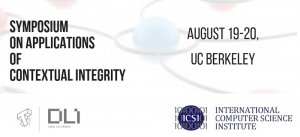Home
Use our global calendar of privacy events to locate an event near you.
FILTER BY
FPF’s monthly Privacy Landscape call is scheduled for NEXT TUESDAY, May 21, 2019 from 4pm-5pm ET.
FPF staff and Tanya Forsheit (Chair of Frankfurt Kurnit’s Privacy & Data Security Group) will provide an update and opportunity to discuss the status of proposed amendments to the California Consumer Privacy Act (CCPA).
We are also fortunate to be joined by Ashwin Machanavajjhala, (Associate Professor, Director of Graduate Studies, Department of Computer Science, Duke University). Prof. Machanavajjhala will describe and discuss his work regarding Ektelo: an open source framework for defining differentially private computation.
Please note: the presentation will be useful to privacy and compliance experts, but will be of particular interest to technical members of your organization’s team. Please invite interested technologists from your organization to join the call!
Resources:
Ektelo: A framework for defining deferentially private computation
Dial-in info for US callers and commonly requested international numbers are below. If you need an additional country-specific dial-in, please let me know.
We look forward to hearing from everyone – it promises to be a great call!
Dial-in info:
US Dial-In: 1 (888) 545-0687 or 1 (630) 691-2764
Passcode: 8180 550#
Belgium: 0800 389 15
France: 0805 102 857
Germany: 0800 222 2013
Ireland: 1800 936 220
Israel: 1809 212 583
Italy: 800 906 150
Netherlands: 0800 0200 273
Poland 0 0800 121 34 45
UK: 0808 238 9856

Each month, the Future of Privacy Forum hosts a call with thought leaders to discuss topical issues related to privacy and responsible data use.
We will provide an update and opportunity to discuss recent privacy updates to the Android and iOS platforms and app stores.
We will also discuss recent legislative developments regarding biometric technologies. Lawmakers are increasingly passing or considering measures that would limit use of facial recognition or other biometric tech by government agencies and/or companies. These issues are top of mind for legislators at the federal, state, and municipal levels.
Dial-in info for US callers and commonly requested international numbers are below. If you need an additional country-specific dial-in, please let me know.
We look forward to hearing from everyone – it promises to be a great call!
Dial-in info:
US Dial-In: 1 (888) 545-0687 or 1 (630) 691-2764
Passcode: 7267 860#
Belgium: 0800 389 15
France: 0805 102 857
Germany: 0800 222 2013
Ireland: 1800 936 220
Israel: 1809 212 583
Italy: 800 906 150
Netherlands: 0800 0200 273
Poland 0 0800 121 34 45
UK: 0808 238 9856

The California Consumer Privacy Act (CCPA) goes into effect on January 1, 2020. While the specifics are still being hammered out, the CCPA will inevitably change how businesses around the world operate. Join data privacy experts, Mark Kahn (General Counsel, Segment), Melissa Maalouf (Shareholder, ZwillGen), and Jeremy Greenberg (Policy Fellow, Future of Privacy Forum), for a fireside chat on the CCPA and the future of consumer data privacy.
In this webinar, you’ll learn:
- What the CCPA means for your industry
- Actionable advice for how you can prepare for the CCPA
- Changes we expect to see before the CCPA even goes into effect
- Regulatory trends impacting data privacy at the state and federal level

The aim of the symposium is to foster interaction among diverse communities of research and practice using contextual integrity to reason about privacy, and to design and evaluate, craft regulation, and generate formal logics for privacy.
As the goal of the workshop is to foster discussion around works in progress, the workshop will not publish formal proceedings (so as to not preclude the publication of subsequent versions of those works, improved by workshop feedback). However, with authors’ permission, we will post accepted submissions on the website.
In addition to other benefits, the California Consumer Privacy Act enhances privacy for individuals when data uses cannot be adequately served using consent alone. The CCPA provides incentives for companies to implement safeguards that reduce data privacy risk from even occurring in the first place. Under the CCPA, this can be accomplished by leveraging new technically enforced, risk-based deidentification controls.
Benefits of Non-Consent Processing (via DeIdentification)
Processing data under the CCPA’s deidentification requirements brings many benefits. They include:
For individuals and society:
+Consumer benefits from data processing that is not well supported via opt-in/consent requirements because of the complexity of processing and difficulty of explanation.
+Societal benefits from having more representative, non-discriminatory data to train accurate and representative artificial intelligence and machine learning models.
For data controllers and processors:
+Greater flexibility in complying with data subject requests to delete data.
+Enhanced ability to lawfully share and combine data with third parties.
+Requirements for Non-Consent Processing (via DeIdentification)
Processing protected personal information via CCPA deidentification exceptions requires that proper technical and organizational safeguards are in place.
Those requirements include:
+CCPA increases deidentification standards to a new “2020 De-ID Standard”
+The 2020 De-ID Standard under the CCPA now requires:
+Technical safeguards to prevent recipients of protected information from inadmissibly re-identifying individuals when used on a distributed, multi-party basis.
+Greater protection than otherwise required under laws that were enacted almost a quarter century ago, like the Health Insurance Portability and Accountability Act.
+Context-aware, risk-based management of re-identification risk.
+Protection against re-identification risk from data in the hands of third parties.
Host:
Dave Cohen, CIPP/E, CIPP/US, Knowledge Manager, IAPP
Panelists:
Deven McGraw, Chief Compliance Officer, Ciitizen (former healthcare privacy official at the Department of Health and Human Services)
Khaled El Emam, Professor, University of Ottawa/CHEO Research Institute
Gary LaFever, CEO, Anonos
Justin Antonipillai, CEO, WireWheel
Processing data under the EU General Data Protection Regulation’s legitimate-interest legal basis can bring many benefits, but to do so properly, the right technical and organizational safeguards must be in place. What are those benefits?
They include:
+Greater flexibility in complying with data subjects’ right to be forgotten requests.
+Flexibility in complying with claims to restrict the processing of personal data.
+Exemption from data subjects’ right of portability.
+The ability to claim that technical and organizational measures are in place in the context of automated decision making.
+All of which bring significant value to the organization. If that’s the case, then what are the technical and organizational safeguards that must be implemented to realize these benefits, and how can your organization put them in place? Join us for this privacy education web conference to learn about this and more.
You’ll hear from experts in the field about:
+How merely claiming to have a legitimate interest in the results of processing is not enough without having accountability controls to support data protection by design and default and transparency obligations.
+What types of technical/organizational safeguards help to satisfy the “Balancing on Interest” test to enable legitimate interest as a legal basis for processing under the GDPR.
+The benefits that greater/lawful data use bring when legitimate interest safeguards are implemented properly.
+The risks that exist when claiming legitimate interest as a legal basis without having the proper safeguards in place.
Host:
Dave Cohen, CIPP/E, CIPP/US, Knowledge Manager, IAPP
Panelist:
Ailidh Callander, Legal Officer, Privacy International
Gary LaFever, CEO, Anonos
Rocco Panetta, CIPP/E, Managing Partner, Panetta & Associati

Hear from the IAPP, ICO, IAF, Anonos and Acxiom on the following:
For those at the crossroads of trying to balance data value and privacy, this web conference teaches the fundamentals of EU General Data Protection Regulation-recommended pseudonymization and how it helps organizations to maximize data utility while increasing accountability, ethics and transparency.
Data drives commerce. It opens up opportunities for businesses to build on a global scale. But those opportunities have brought challenges in data innovation and utility, risk and the privacy of individuals. To date, commerce has experimented with consent to manage these risk and privacy challenges. But consent alone no longer works in many situations; we need to go above and beyond consent by itself. This webinar will look at a complement to consent, a technological application that is a “belt and braces” approach to balancing privacy and data value when consent does not work. Panelists will discuss how to fully maximize data value while maintaining privacy, through the use of GDPR-recommended pseudonymization safeguards, to achieve ethical data use, while maximizing data utility.
Join us for this data privacy education web conference to learn about this and more. You’ll hear from experts in the field about:
+What is the 5th Cookie working group (www.5thCookie.com), and what does it hope to achieve?
+How does the 5th Cookie approach leverage GDPR-recommended pseudonymization?
+How does it enable ethical advertising technology/real-time bidding?
+How to apply GDPR-recommended pseudonymization to other data uses (non-adtech/RTB)?
+What are the benefits of leveraging pseudonymization to enforce risk-based data governance policies?
+What do you gain when you can resolve conflicts between maximizing data value and protecting privacy?
Panelists:
+Paul Comerford, Principal Technology Policy Advisor, ICO UK Data Protection Authority
+Martin Abrams, Executive Director and Chief Strategist, International Accountability Foundation
+Gary LaFever, CEO, Anonos
+Dr. Sachiko Scheuing, CIPP/E, European Privacy Officer and Data Protection Officer, Acxiom

Complying with GDPR, CCPA and emerging state laws requires a good technical and business understanding of ad tech in order to assess relationships with a wide range of partners.
For a deeper dive into the nuts and bolts of ad tech, please join us on Wednesday, April 8th, from 10am – 12pm Eastern Time for a training on data collection methods and business models for tracking, analytics, and advertising. Topics will include: basic ad delivery and reporting, online and mobile platforms and data flows, real-time bidding (RTB), and analytics as well as an overview of the current discussions on the future of ad tech.
Participants will gain an understanding of:
- How browsers work and why default browser settings matter when performing a cookie audit of a website.
- How online advertising works, including the intricacies of real-time bidding and the interplay between the various participants in the ad-ecosystem.
- An overview of the ideas being discussed in response to the phasing out of support for third-party cookies and the working groups and standards efforts to follow to track the post-cookie discussions.
Expert Speakers Include:
- Christy Harris, Director of Technology & Privacy Research, Future of Privacy Forum
- Dr. Rob van Eijk, Managing Director, Europe, Future of Privacy Forum
Please register as soon as possible, as space is limited.
This event will ONLY be live-streamed for remote participation and will be recorded.
